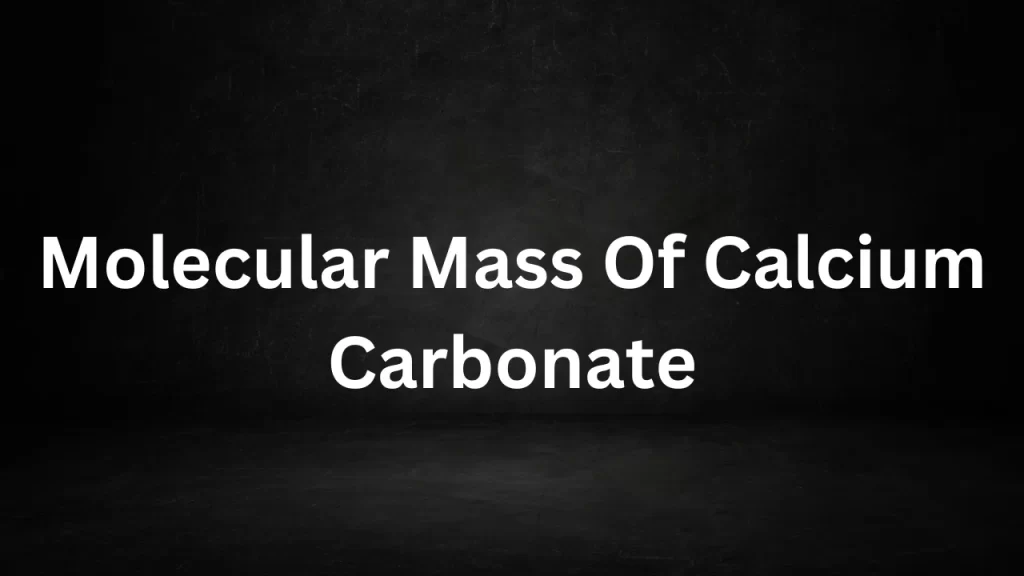Tag: caco3 mwt
Molecular Mass Of Calcium Carbonate
Molecular Mass Of Calcium Carbonate: The molecular mass of calcium carbonate, often referred to as calcium carbonate’s molar mass, is a fundamental concept in chemistry.
It plays a crucial role in various scientific fields, including chemistry, geology, environmental science, and industry. In this article, we will explore what the molecular mass of calcium carbonate is, how it is calculated, its significance, and its practical applications.

Molecular Mass Of Calcium Carbonate
Defining Molecular Mass
The molecular mass, also known as molar mass, of a compound is the mass of one mole of that substance expressed in grams per mole (g/mol). In the case of calcium carbonate (CaCO3), its molecular mass represents the combined mass of one mole of calcium (Ca) atoms, one mole of carbon (C) atoms, and three moles of oxygen (O) atoms.
Calculation of Molecular Mass
To calculate the mole mass of calcium carbonate (CaCO3), we sum the atomic masses of its constituent elements:
- Calcium (Ca): Atomic mass ≈ 40.08 g/mol
- Carbon (C): Atomic mass ≈ 12.01 g/mol
- Oxygen (O): Atomic mass ≈ 16.00 g/mol
Now, let’s calculate the mole mass of CaCO3:
Molecular Mass of CaCO3 = (Molar Mass of Ca) + (Molar Mass of C) + (3 × Molar Mass of O)
The Molecular Mass of CaCO3 = (40.08 g/mol) + (12.01 g/mol) + (3 × 16.00 g/mol)
Molecular Mass of CaCO3 ≈ 100.09 g/mol
Therefore, the mole mass of calcium carbonate (CaCO3) is approximately 100.09 grams per mole.
Significance in Chemistry
- Stoichiometry: The mole mass of calcium carbonate is fundamental in stoichiometry, allowing chemists to calculate the quantities of reactants and products in chemical reactions involving CaCO3.
- Formulation Chemistry: It is important in industries like agriculture and pharmaceuticals for formulating products that contain calcium carbonate.
- Environmental Science: Knowledge of the molecular mass of CaCO3 is essential for understanding its role in environmental processes, such as the dissolution of limestone in natural waters.
Real-World Applications
- Geology: The mole mass of calcium carbonate is crucial in geological studies, where it helps identify and quantify carbonate minerals in rocks and sediments.
- Agriculture: Calcium carbonate is commonly used as a soil conditioner and in the formulation of agricultural products, benefiting from its mole mass calculations.
- Pharmaceuticals: It finds applications in antacids and calcium supplements, where the molecular mass influences dosages and formulations.
- Environmental Monitoring: Understanding the mole mass is important for analyzing the presence and concentration of calcium carbonate in natural water bodies, which can affect water quality and aquatic life.
Conclusion
The mole mass of calcium carbonate (CaCO3), approximately 100.09 g/mol, is a foundational concept in chemistry with broad-reaching implications. It serves as a cornerstone in stoichiometry, formulating various industrial products, and understanding environmental processes. Additionally, its significance extends to geological studies, agriculture, pharmaceuticals, and environmental monitoring. An in-depth comprehension of the mole mass of calcium carbonate is not only essential for scientific research but also for addressing practical challenges in diverse fields.
Read More
- Molar Mass Of Carbon Dioxide
- Difference Between Force And Momentum
- Law Of Conservation Of Linear Momentum
- Molecular Weight Of MgSO4
- Molecular Weight Of H3PO4
Frequently Asked Questions (FAQs) On Molecular Mass Of Calcium Carbonate
1. What is the molecular mass of calcium carbonate (CaCO3)?
The mole mass of calcium carbonate (CaCO3) is approximately 100.09 grams per mole (g/mol).
2. How is the molecular mass of calcium carbonate calculated?
To calculate the molecular mass of CaCO3, you sum the atomic masses of its constituent elements: calcium (Ca), carbon (C), and oxygen (O).
3. What is the atomic mass of calcium (Ca)?
The atomic mass of calcium is approximately 40.08 g/mol.
4. What is the atomic mass of carbon (C)?
The atomic mass of carbon is approximately 12.01 g/mol.
5. What is the atomic mass of oxygen (O)?
The atomic mass of oxygen is approximately 16.00 g/mol.
Molecular Weight Of Calcium Carbonate
Molecular Weight Of Calcium Carbonate: In the world of chemistry, the molecular weight of a compound is a fundamental concept that underpins various aspects of chemical analysis and research.
One compound that serves as an excellent illustration of this concept is calcium carbonate (CaCO3). In this article, we will explore the molecular weight of calcium carbonate and its significance in chemistry and everyday life.

Molecular Weight Of Calcium Carbonate
Calcium Carbonate (CaCO3): The Basics
Before delving into the molecular weight of calcium carbonate, let’s acquaint ourselves with this compound. Calcium carbonate, represented chemically as CaCO3, is a common chemical compound with widespread applications in various fields.
In its native state, calcium carbonate is present in geological formations and minerals like limestone, marble, and chalk. For centuries, these naturally formed deposits have been tapped into for a wide range of purposes, spanning from construction and artistic creations to medicinal applications. Calcium carbonate is also a major component of seashells and pearls.
Understanding Molecular Weight
The molecular weight of a compound is a numerical value that reflects the mass of one mole of that compound. It can be denoted in units such as atomic mass units (amu) or grams per mole (g/mol). To calculate the molecular weight of calcium carbonate, we need to consider the atomic weights of its constituent elements: calcium (Ca), carbon (C), and oxygen (O).
Here are the atomic weights of these elements:
- Calcium (Ca): Approximately 40.08 g/mol
- Carbon (C): Approximately 12.01 g/mol
- Oxygen (O): Approximately 16.00 g/mol
Now, we can calculate the molecular weight of calcium carbonate (CaCO3):
Molecular Weight (CaCO3) = Atomic Weight(Ca) + Atomic Weight(C) + 3 × Atomic Weight(O) Molecular Weight (CaCO3) = 40.08 g/mol + 12.01 g/mol + 3 × 16.00 g/mol Molecular Weight (CaCO3) ≈ 100.09 g/mol
Therefore, the mole weight of calcium carbonate is approximately 100.09 grams per mole.
Significance of Molecular Weight
Understanding the mole weight of a compound, such as calcium carbonate, has several practical implications:
- Stoichiometry: Mole weight plays a crucial role in balancing chemical equations and determining the proportions of substances involved in chemical reactions.
- Concentration Calculations: It is essential for calculating the concentration of calcium carbonate in solutions, which is significant in fields like environmental science and chemistry.
- Molar Mass: Mole weight is used to calculate the molar mass of calcium carbonate, which is useful for quantifying amounts in moles.
- Formulation: In various industries, including agriculture and pharmaceuticals, knowledge of molecular weight aids in formulating products and determining dosages.
- Physical Properties: Molecular weight influences the physical properties of a substance, such as its density and melting and boiling points.
Practical Applications of Calcium Carbonate
Calcium carbonate has a wide range of practical applications. It is used as a dietary supplement, in the paper industry as a filler and coating pigment, in the production of cement and concrete, and as an antacid for heartburn relief. Additionally, it serves as a key component in the manufacturing of ceramics, paints, plastics, and various building materials.
In conclusion, the mole weight of calcium carbonate (CaCO3) is approximately 100.09 grams per mole. This value is not only essential in understanding the composition of calcium carbonate but also pivotal in various scientific, industrial, and everyday applications. Whether you’re studying chemical reactions, determining concentrations, or manufacturing everyday products, the concept of molecular weight remains a cornerstone in the world of chemistry and materials science.
Read More
- Molecular Weight Of Sodium Hydroxide
- Molecular Weight Of Aluminium
- Molecular Weight Of CaCl2
- Molecular Weight Of Copper
- Molecular Mass Of Ethanol
Frequently Asked Questions (FAQs) Molecular Weight Of Calcium Carbonate
1. What is the molecular weight of calcium carbonate (CaCO3)?
The molecular weight of calcium carbonate (CaCO3) is approximately 100.09 grams per mole.
2. Why is the molecular weight of calcium carbonate important in chemistry?
The molecular weight is crucial in chemistry as it provides information about the compound’s mass and composition, which is essential for various calculations, including stoichiometry, concentration determination, and molar mass calculations.
3. What are the constituent elements of calcium carbonate, and what are their atomic weights?
Calcium carbonate consists of three elements: calcium (Ca), carbon (C), and oxygen (O). Here are their approximate atomic weights:
- Calcium (Ca): ~40.08 g/mol
- Carbon (C): ~12.01 g/mol
- Oxygen (O): ~16.00 g/mol
4. How is the molecular weight of calcium carbonate calculated?
The mole weight of calcium carbonate is calculated by summing the atomic weights of its constituent elements: Ca, C, and three O atoms. The calculation is as follows: Molecular Weight (CaCO3) = Atomic Weight(Ca) + Atomic Weight(C) + 3 × Atomic Weight(O)
5. What are some practical applications of calcium carbonate?
Calcium carbonate finds applications across a multitude of industries, encompassing agriculture (as a soil conditioner), pharmaceuticals (as a dietary supplement), construction (in the production of cement and concrete), paper manufacturing (as a filler), and serving as an antacid for relieving heartburn.
Molecular Weight Of Carbon
Molecular Weight Of Carbon: Hydrogen, the first element on the periodic table, holds a special place in the world of chemistry and physics due to its simplicity and ubiquity in the universe. One of the key characteristics that defines hydrogen is its molecular weight, a fundamental property that influences its behavior, applications, and significance in various scientific fields.

Molecular Weight Of Carbon
The Atomic Weight of Hydrogen
Before delving into the molecular weight of hydrogen, it’s essential to understand the atomic weight of a single hydrogen atom. The atomic weight of an element is essentially a weighted average of its isotopes, and hydrogen has three isotopes: protium (¹H), deuterium (²H or D), and tritium (³H or T). However, the atomic weight commonly associated with hydrogen is approximately 1.008 amu (atomic mass units), which corresponds to the most abundant isotope, protium.
Molecular Weight of Hydrogen (H₂)
The molecular weight of hydrogen is calculated by considering a molecule of hydrogen gas, H₂, which consists of two hydrogen atoms. Since each hydrogen atom has an atomic weight of approximately 1.008 amu, the calculation is straightforward:
Molecular Weight of Hydrogen (H₂) = 2 × Atomic Weight of Hydrogen ≈ 2.016 g/mol
Hence, the molecular weight of hydrogen gas (H₂) is approximately 2.016 grams per mole (g/mol). This value is incredibly low, making hydrogen the lightest element and the lightest molecule known.
Significance of Hydrogen’s Low Molecular Weight
The low molecular weight of hydrogen is a defining characteristic that has profound implications across various scientific domains:
- Efficient Fuel: Hydrogen’s low molecular weight contributes to its role as an efficient fuel source. In combustion reactions, hydrogen releases a high amount of energy per unit mass, making it an ideal choice for rockets, fuel cells, and clean energy solutions.
- Buoyant Gas: Hydrogen’s low density relative to air gives it buoyancy. In the early days of aviation, hydrogen-filled airships, such as the infamous Hindenburg, were used for transportation. However, safety concerns due to hydrogen’s flammability led to the adoption of helium, a non-flammable alternative.
- Chemical Reactivity: The low molecular weight of hydrogen results in high chemical reactivity. It readily reacts with various elements, including oxygen, forming water (H₂O) in combustion reactions. Its reactivity is fundamental in numerous chemical processes and industrial applications.
Conclusion
The molecular weight of hydrogen, approximately 2.016 g/mol, is a fundamental property that defines the behavior and applications of this remarkable element. Its lightness, efficiency as a fuel, and widespread availability make it a subject of immense interest in scientific research and technological advancements. Understanding hydrogen’s molecular weight is essential for harnessing its potential as a clean energy source, propelling space exploration, and exploring new frontiers in chemistry and physics.
Read More
- Molecular Weight Of Hydrogen
- Molecular Weight Of Urea
- Molecular Mass Of Urea
- Molecular Mass Of Hydrogen
- Molecular Mass Of Nacl
Frequently Asked Questions (FAQs) Molecular Weight Of Carbon
1. What is the molecular weight of carbon?
The molecular weight of carbon is approximately 12.011 grams per mole (g/mol). This value represents the mass of one mole of carbon atoms and is used as a basis for calculating the molecular weights of various carbon-containing compounds.
2. How is the molecular weight of carbon calculated?
The mol weight of carbon is calculated based on the atomic weight of a carbon atom. Carbon has several isotopes, but the most common isotope is carbon-12 (¹²C), which has an atomic weight of exactly 12 atomic mass units (amu). Therefore, the molecular weight of carbon is equal to the atomic weight of carbon-12:
mol Weight of Carbon = Atomic Weight of Carbon-12 ≈ 12.011 g/mol
3. Why is the molecular weight of carbon important in chemistry?
The mol weight of carbon is a fundamental property that influences the mol weights of organic and inorganic compounds. It serves as a reference point for determining the mass of carbon atoms in various molecules, enabling chemists to calculate and compare the masses of different compounds.
4. Does the molecular weight of carbon vary for different isotopes of carbon?
Yes, the mol weight of carbon can vary slightly when considering different carbon isotopes. While the most common isotope, carbon-12 (¹²C), has an atomic weight of exactly 12 amu, other isotopes like carbon-13 (¹³C) and carbon-14 (¹⁴C) have slightly different atomic weights. However, in most chemical calculations and applications, the atomic weight of carbon-12 is used for simplicity.
5. How is the molecular weight of carbon relevant in organic chemistry?
In organic chemistry, carbon is the backbone of organic compounds. The mol weight of carbon is crucial for determining the molecular weights of organic molecules and calculating stoichiometry in chemical reactions. It plays a central role in understanding the composition and properties of organic compounds.